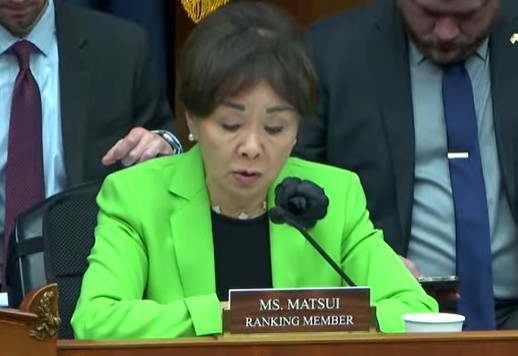Congress Seeks Stronger Response to Chinese Cyberthreat

WASHINGTON — Defense policy analysts described data vulnerabilities for a congressional panel Thursday they said China could exploit to shut down broad segments of U.S. infrastructure.
They said China’s lead in manufacturing high-tech equipment has exposed the United States to a variety of risks regarding key infrastructure elements, particularly if the U.S. military responds to a Chinese invasion of Taiwan. Potential weak points could include technologies for communications, electrical grids, water systems and medical facilities.
American defenses against a cyberattack from China are “like locking up the house but leaving the back door open,” said Rep. Doris Matsui, D-Calif.
The House Energy and Commerce subcommittee called the hearing as it considers several legislative proposals to close loopholes in U.S. data security.
One of them, introduced by Matsui, is called the Future Uses of Technology Upholding Reliable and Enhanced Networks Act, H.R. 1513. It would require the Federal Communications Commission to establish a task force to report to Congress on development of standards and uses for 6G wireless technology.
The 6G technology refers to high-speed wireless communications still under development in a race among companies and governments worldwide. It would improve users’ ability to benefit from emerging technologies, such as artificial intelligence and decentralized financing.
It also could help China and other countries as they try to infiltrate American data networks.
A second pending bill, called the Foreign Adversary Communications Transparency Act, H.R. 820, would require the Federal Communications Commission to identify any entity holding a U.S. telecommunications license with ties to China, Cuba, Iran, North Korea, Russia or Venezuela.
The get-tough stance lawmakers are taking toward China is prompted mostly by its 2017 National Intelligence Law, which “requires Chinese companies to support, provide assistance and cooperate in China’s national intelligence work, wherever they operate.”
Some of the companies sell equipment in the United States.
The worst offenders accused during the hearing of the Subcommittee on Communications and Technology are the Chinese government-backed companies Huawei, DJI and ZTE.
Each of them sells consumer and industrial electronic equipment, much of which is connected to the internet or uses satellite communications. After years of sales in the United States, intelligence and American corporate reports indicated China could use the internet and satellite connections to gather data on its equipment users.
The intelligence reports also said China could use the same connections for a cyberattack against networks of the equipment users.
One U.S. government response was the Secure and Trusted Communications Networks Act, which Congress passed in 2019.
It bans importing communications equipment and services that pose a national security risk. It also required removal of any such equipment or services already set up in U.S. networks.
As intelligence reports show continuing Chinese efforts to penetrate U.S. data networks, Congress is upping its game to counter the threat.
“Every minute, China is trying to infiltrate communications networks across the globe,” said Rep. Bob Latta, R-Ohio, chairman of the Subcommittee on Communications and Technology. “The Chinese Communist Party does not play by the rules.”
He mentioned as an example a report last week from the Cybersecurity and Infrastructure Security Agency saying Chinese hackers secretly entered U.S. “communications, energy, transportation and water” networks five years ago and have been monitoring them consistently since then.
An alert from the agency said, “[The] People’s Republic of China state-sponsored cyber actors are seeking to pre-position themselves on IT networks for disruptive or destructive cyberattacks against U.S. critical infrastructure in the event of a major crisis or conflict with the United States.”
The defense policy analysts spoke of similar threats in their testimony.
“Chinese espionage has escalated to unprecedented levels,” said James Lewis, a vice president for the Center for Strategic and International Studies.
After years of purchasing low-cost, high-quality electronic equipment from China, the United States has become dependent on Chinese imports, he said.
“We’ve boxed ourselves in,” Lewis said. “There may not be U.S. sources of supply.”
He recommended government subsidies for American electronic equipment manufacturers.
Lindsay Gorman, a fellow for emerging technologies at the German Marshall Fund, said Chinese spying runs through many devices that connect to the internet, even compiling data on car buyers.
“Do we want all that data going to Beijing?” Gorman asked.
You can reach us at [email protected] and follow us on Facebook and X.
























